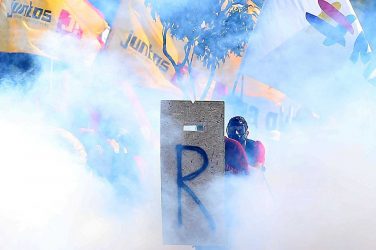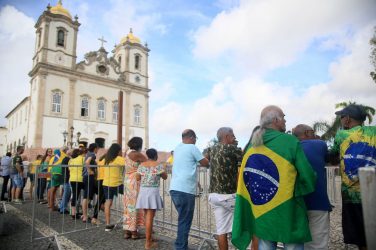This year’s Brazilian election is entering a decisive phase. With official television advertising beginning on August 31, voters will be bombarded by electoral messages for 50 minutes every evening, forcing them to think about their options for president, governor, and members of congress and the state legislatures from now until October 4. And the choices are far from easy.
The most popular presidential candidate, former president Luiz Inácio Lula da Silva, is serving prison time on corruption charges and unlikely to be allowed to run; the next most popular candidate, Jair Bolsonaro, has been compared to none other than Donald Trump, a comparison he seems almost to embrace.
Observers worry that he could not only finish in the top two in the first round of the election on October 7, but even win the runoff three weeks later to capture the presidency.
But disturbing as Bolsonaro might be, he is not the root cause of Brazil’s democratic atrophy. His emergence owes a lot to the disastrous developments of the last few years, and is indicative of a deepening democratic crisis.
In their book, How Democracies Die, the political scientists Steve Levitsky and Daniel Ziblatt argue that democracies depend on informal rules of mutual toleration and institutional forbearance. Mutual toleration ensures that candidates and other political actors recognize each other as legitimate rivals, not existential threats; institutional forbearance is restraint from using one’s full legal or organizational prerogatives so as not to endanger the system, respecting the spirit as well as the letter of the law.
And like other beleaguered democracies, Brazil has seen both of these dwindling in recent years.
One example that sticks out is the behavior of the losing candidate in the last presidential election, Aécio Neves. After the incumbent president, Dilma Rousseff, won a narrow victory in the second round runoff, Neves refused to accept the result; through his party, the PSDB (Party of Brazilian Social Democracy), he demanded that the Supreme Electoral Court conduct an audit of the vote count. The court found no fraud, and a year later, Neves’ own party reached the same conclusion – but a dangerous precedent had been set.
The Slippery Slope
A year or so later, the opposition set about impeaching Rousseff. In a series of maneuvers that were legally permissible but of dubious legitimacy, the opposition impeached the president on the grounds that she had violated the law in administering the federal budget, even though she only did what many others in similar positions had done.
Decided in August of 2016 by a vote in the senate and upheld by the president of the Supreme Court, Rousseff’s ultimate impeachment and removal from office looked like a punishment for her economic incompetence and loss of a congressional majority, with the budgetary malfeasance a mere pretext.
Her successor was her own vice-president, Michel Temer – a man who has gone on to become one of the most unpopular presidents in recent Brazilian history.
But it’s not just elected representatives who’ve shown a lack of toleration and forbearance. The so-called Operation Car Wash, a massive anti-corruption investigation that uncovered a large-scale kickback scheme in the state-owned oil company Petrobras, has empowered a new set of judges, prosecutors, and police investigators, some of whom are overstepping the bounds of their authority in their zeal to root out corruption.
Back in March 2016, Sergio Moro, the federal judge who eventually convicted Lula of corruption in 2017, released a phone conversation between Rousseff and Lula that had been recorded after the warrant authorizing the wiretap had expired.
And in July 2018, when an appeals court judge ordered that Lula be released (a ruling that was quickly overturned) Judge Moro insisted that the decision was incorrect, despite having no authority to rule on the matter. He may not have violated the letter of the law, but he has behaved more like a partisan politician than an impartial adjudicator of legal cases.
Still, the Workers’ Party also shares the blame for this democratic decline. When campaigning for the presidency, Dilma Rousseff worked hard to frighten poor voters into thinking that her opposition would take away their benefits if she lost; once elected, her government imposed austerity measures.
More than that, the Workers’ Party has not attempted to distance itself from the systematic corruption that appears to have taken place under its administration from 2003 to 2016, and it has taken no serious steps to repair and renew itself as a political force after an abject few years.
The upshot is the most wide open (and perhaps the most dreaded) presidential contest in Brazil since 1989.
In the Running
With Lula almost certainly ruled out, the most likely Workers’ Party candidate is current vice-presidential candidate Fernando Haddad, a former minister of education and mayor of São Paulo. The Workers’ Party will have to introduce Haddad to an electorate that doesn’t know him well, and convince them that he’s Lula’s preferred candidate.
The PSDB, meanwhile, is represented by Geraldo Alckmin, former governor of São Paulo and head of the broadest multi-party coalition in the race. He will have to distance himself from the unpopular Temer and present his administrative experience and lack of charisma as assets rather than liabilities.
Running outside the three major parties (the third being the PMDB of President Temer), former environment minister and senator Marina Silva will try to convince voters that she is not only honest but can get things done, while Ciro Gomes, former governor of Ceará and minister of national integration, will try to reassure voters that he has the temperament to govern.
And then there’s Bolsonaro. A former army captain, he’s a polarizing figure: nostalgic for the dictatorship of 1964-85, an advocate of police violence, and hostile to Afro-Brazilians, women and gays. Were he to win, the decline of tolerance and forbearance in Brazilian politics might well accelerate dramatically.
Still, because a presidential candidate must win a majority of the valid votes, forcing first-round winners with less than a majority into a second round runoff, Bolsonaro’s ultimate victory looks less probable. And unlike Donald Trump, Bolsonaro doesn’t have an effective party machine backing him to help get out the vote. But even if Brazil is spared a Bolsonaro presidency, few people will celebrate.
The new government will find itself in a fiscal and political straightjacket, forced to deal with the same old party leaders in Congress and a disgruntled, polarized population. Any new president will inevitably begin to disappoint the electorate as soon as he or she is inaugurated on January 1 2019; their best hope may be to simply try to muddle through.
Anthony Pereira is director of the King’s Brazil Institute at the King’s College London
This article was originally published in The Conversation. Read the original article here: https://theconversation.com/brazils-democracy-is-on-the-ropes-and-now-a-dreaded-election-begins-102283
Tags:












